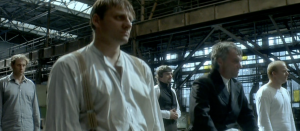Many people feel a deep, personal connection to a particular book.
Maybe it’s a memorable piece of children’s fiction which resonates throughout life. For others, it’s an Austen, Dickens, or a Bronte. It could even be a graphic novel or an Oprah book (she does pick good books).
My book is Fyodor Dostoevsky’s The Brothers Karamazov. I first plucked a wrinkly purple softcover version from a bookshelf in high school. The classic tale of patricide fascinated me with its complexity, offbeat humour, compelling, rich characters, and equal infusions of faith and unbelief.
book is Fyodor Dostoevsky’s The Brothers Karamazov. I first plucked a wrinkly purple softcover version from a bookshelf in high school. The classic tale of patricide fascinated me with its complexity, offbeat humour, compelling, rich characters, and equal infusions of faith and unbelief.
Only recently did I decide to check out TBK on film. People say movies are never as good as books. It seems that would go double for a 700-page philosophical detective drama. And I’m obviously not the only one (picture at right based on a hilarious Onion article). But nevertheless, I proceeded.
Lo and behold, look up Karamazov on IMDB and you’ll find no less than 10 film versions of the Brothers (only three of which are in English). Two intrigued me: the Yul Brynner vehicle The Brothers Karamazov (1958), and Karamazovi aka “The Karamazovs” (2008), a recent Czech adaptation. The first is an overly long vehicle for featuring Brynner (as Dmitri) opposite a 27-year-old William Shatner (as Alyosha). Skip it.
 But the second is an absolutely compelling piece of film.
But the second is an absolutely compelling piece of film.
It begins on a bus. A Czech theatre company (from the actual Dejvicke Theatre) is on its way to a Polish foundry to put on a production of The Brothers Karamazov. They’ve received a grant to bring art into industrial settings.
Upon arrival, the crew also learns a disturbing fact about the foundry: a small son of one of the workers recently fell off a platform and is in critical condition in the hospital. The worker is nervously hanging around as he awaits news of his son, a foil of the story of Ilyusha Snegiryov.
The bulk of the film is the theatre group’s rehearsal of TBK (the Evald Schorm adaptation) in front of a skeleton crew at the foundry. In this adaptation, the patricide is a fait accompli at the beginning and is followed by a series of austerely staged flashbacks starring the passionate Dmitri, the contemplative Alyosha, the cynical Ivan, and that obsequious, wily bastard, Smerdyakov.
Having staged the play for nearly a decade, the actors’ performances are flawless. The modern story amplifies the themes of the play. Why is that worker watching a play and not at the hospital with his family? The cast whispers offstage that the story is a construct of the director determined to get the most out of the cohort.
The Polish foundry setting lends the play a cold, desperate feeling. A picture of Karol Wojtyla – Polish pope John Paul II – substitutes for an Orthodox icon. Enormous industrial hooks tie the play to the present; the worker identifies them as hooks mentioned by Fyodor Karamazov as he mocks the faith of his son, Alyosha.
“These are the hooks,” he calmly tells the actor playing Ivan. “This is hell.”
It all makes for a deeply moving rendering.
In every era of my life, I’ve returned to The Brothers Karamazov and always found it rich and rewarding. When I first picked up the book, I was a novice in the big questions of life. Ivan’s Grand Inquisitor struck me with the haunting idea of freedom and the nature of religion, and Father Zossima offered a living, contemplative faith. To venture with Alyosha into the messy world seemed my calling as well.
Critics may deem the novel too long, convoluted, and replete with too many characters. Still it is undeniably a masterpiece. I own several copies and frequently evangelize on its behalf. I will now do so for the considerably shorter film as well.
Karamazovi is no substitute for The Brothers Karamazov, but it is a joyous discovery.

